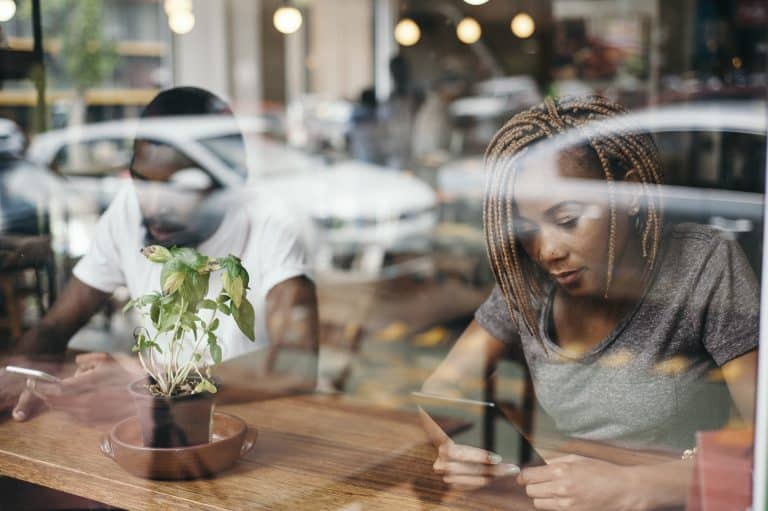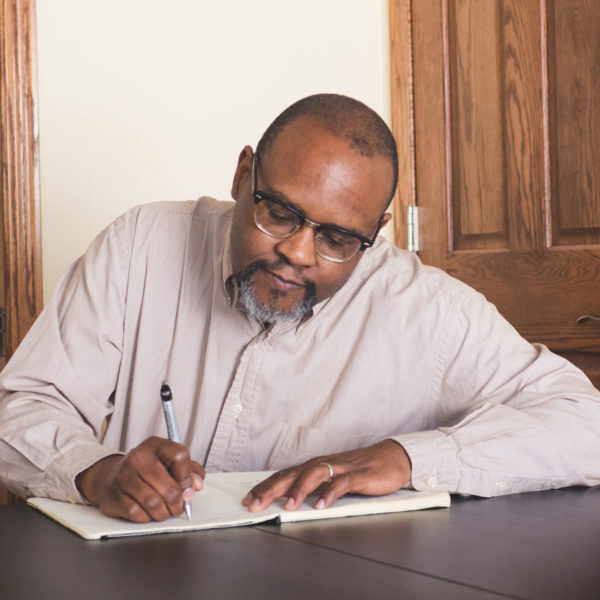
Image by Kat Grudko/Getty Images, © All Rights Reserved.
City of Twitter
“See man, that’s the difference between us. You think we’re fighting; I think we’re finally talking.”
— Rod Tidwell, Jerry Maguire
I still don’t remember how I first heard the news, because tragedies these days arrive less from some network TV bulletin than they leak through social media. You get a text from a friend or loved one: “Have you heard…?” “You should turn on the TV.” “You should go online.”
But I remember the sledgehammer impact of hearing about the assassinations in Charleston in the summer of 2015.
Trayvon Martin. Eric Garner. Michael Brown. For several years the hashtags multiplied. But the killing of nine Black people at Emanuel AME church, the murders at the hands of a white man whom they had welcomed into their midst to pray with them, punched a hole in my spirit. I wandered into a fog of helpless, hopeless, angry despair made worse by the silence of the white people I encountered around me. Beyond expressions of short-term shock and sympathy, for them life moved on.
Only when I logged on to Twitter did I find the community of grief that reflected my own reactions.
An introvert by nature, I’ve always been ambivalent about community. My circle of close friendships stays small. Still, I love the hubbub and energy of cities and the chances for interaction and exploration they offer. And since that summer nearly three years ago, I’ve found an invigorating balance between the two in social media.
Of course, I’m not oblivious to Twitter’s perils. The anonymity that helps people share their intimate thoughts, feelings, and struggles invites others to spew cruelty, bigotry, abuse, and threats of violence. Sometimes I’ve been on the receiving end of avalanches of invective when I’ve drawn the ire of one person who had then called on like-minded others to pile on. My favorite single insult is when I was labeled a “virtue-signaling piece of shit.”
I’ve spent more time than I’d like scrolling through my timeline blocking dozens of haters one by one. And my experience pales in comparison to what some have endured — including women, and particularly women of color — that has caused them to leave Twitter altogether. Sexism, racism, homophobia, xenophobia can be found on the site on any given day without much trouble.
Of course, characterizing social media as “dangerous” suggests that for marginalized people life in the offline world is relatively “safe.” In a way, seeing overtly the hatred that people of color have known exists but that generally stays subterranean actually reassured me: It’s not my imagination that bigotry still thrives.
Social media also gets criticized as a place where people only listen to the like-minded, where we are less and less exposed to ideas different from those we already hold. I can’t say how generally true that is, but I do know that there are times, particularly for those who have been marginalized, for people of color and oppressed women and the disabled and others who are deemed “different,” when hearing from others who know and see and experience the world as you do can be literally life-saving. We don’t always need someone to agree with us, but we do all need our humanity to be affirmed, and that can be hard to come by for many of us.
This criticism ignores another reality of my Twitter experience because it suggests that people go on the site mainly to talk when I’m drawn by how it enables us to listen to one another.

Nearly everyone I follow on Twitter disagrees with and/or differs from me. This includes atheists, agnostics, and people with deep religious beliefs; the working class and the wealthy; indigenous people, those of European, Latin, African, Asian descent, and all sorts of mixtures; citizens from the U.S. and those from nations around the world; Republicans, Democrats, libertarians, Greens, socialists, anarchists, and the apolitical; cis and transgender men and women, and those across the spectrum of gender identity and sexuality; those dealing with mental illness or physical disabilities, and those who are not. I read the quarrels among — and within — these groups; I gain a brief window into the experiences of those radically different from me; I learn.
Hearing these multiple voices has also changed the way I think about myself. In various social situations, we highlight aspects of ourselves and downplay others: professional over political, artistic over racial, aggressive over sensitive, playful over serious — or, of course, the opposite depending on where we are. I “am” all of these elements, but no other social space — virtual or otherwise — has felt as accepting of all the aspects of me: the writer, the parent, the partner, the arguer, the thinker, the sports addict, the film fan, the political junkie, the smart aleck, the spiritual seeker.
As I’ve felt freer to be who I am in the moment, exploring my various identities has also released writing voices I had kept within my head. I’ve realized that voices I’d hidden in solitude could actually speak the experiences and feelings of others. And my dialogue between solitude and community has caused me to question how our culture often misrepresents and poisons community.
Too often we define communities in terms of what we share or have in common. But this overlooks community’s other dynamic: disagreement. When we disagree, we create the energy and space for real dialogue and value exploration. We learn; we grow.
A family. A city. A country. A corporation. A neighborhood. A religion. A team. No community has a single face or perspective. A community is a collection or those perspectives engaging one another in search for something. What binds a community isn’t agreement but commitment, and the ground of that — or any other — commitment is honesty and good faith.
I believe that what unsettles some about Twitter is the very quality that makes it worthwhile: members’ willingness not only to challenge one another’s ideas, beliefs, knowledge, and logic, but to demand good faith even as they disagree. This is a challenge not simply to “prove” statements, but to demonstrate in the way we converse that we’re trying to get at reality rather than score points.
What some decry as “call-out culture” essentially boils down to a single question: “Are you being honest?” About yourself? About your motives? About your allegiances and values? About what you really believe? About what you really know? About what you claim not to know?
I’ve received those challenges. I know how disconcerting they can be. It’s what causes those with privilege to recoil from the critiques of the marginalized. But oppressed and marginalized people have had to live in the chasm between the words and deeds of the powerful. In the context of that history, to say, “I can’t trust your argument until I trust your good will and honesty” is essential. And if I choose to take up that challenge, it forces me into a healthy, reflective solitude, to re-examine myself.
When that happens — however rarely — what looks like fighting ends up really being about talking, the kind of talking that makes community possible.
Twitter — and other social media — are communities to me, and, whether we like it or not, they reveal the challenges our real-world community poses. We can hide from that challenge, at our peril, or we can embrace it.

Share your reflection